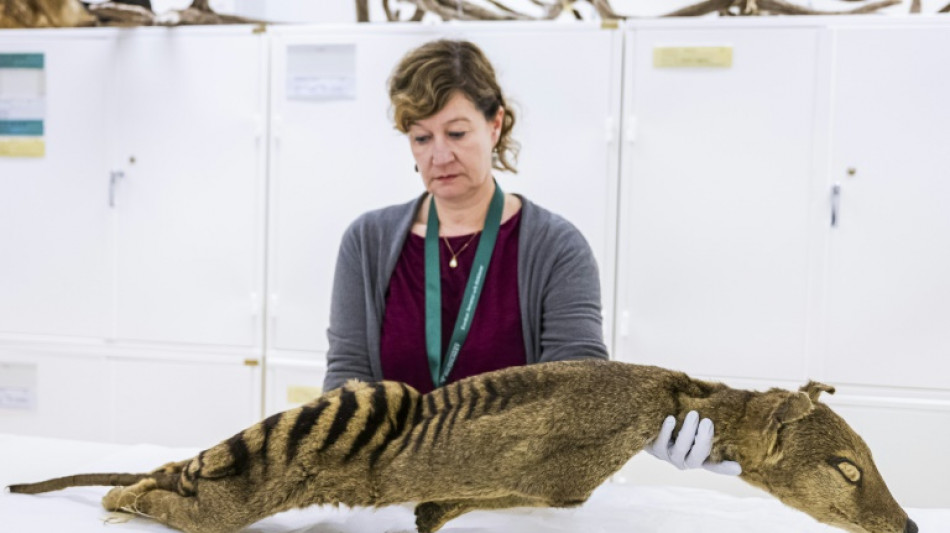
-
 Win or bust in Europa League for Amorim's Man Utd
Win or bust in Europa League for Amorim's Man Utd
-
Trump celebrates 100 days in office with campaign-style rally

-
 Top Cuban dissidents detained after court revokes parole
Top Cuban dissidents detained after court revokes parole
-
Arteta urges Arsenal to deliver 'special' fightback against PSG

-
 Trump fires Kamala Harris's husband from Holocaust board
Trump fires Kamala Harris's husband from Holocaust board
-
Pakistan says India planning strike as tensions soar over Kashmir attack

-
 Weinstein sex attack accuser tells court he 'humiliated' her
Weinstein sex attack accuser tells court he 'humiliated' her
-
France accuses Russian military intelligence over cyberattacks

-
 Global stocks mostly rise as Trump grants auto tariff relief
Global stocks mostly rise as Trump grants auto tariff relief
-
Grand Vietnam parade 50 years after the fall of Saigon

-
 Trump fires ex first gentleman Emhoff from Holocaust board
Trump fires ex first gentleman Emhoff from Holocaust board
-
PSG 'not getting carried away' despite holding edge against Arsenal

-
 Cuban dissidents detained after court revokes parole
Cuban dissidents detained after court revokes parole
-
Sweden stunned by new deadly gun attack

-
 BRICS blast 'resurgence of protectionism' in Trump era
BRICS blast 'resurgence of protectionism' in Trump era
-
Trump tempers auto tariffs, winning cautious praise from industry

-
 'Cruel measure': Dominican crackdown on Haitian hospitals
'Cruel measure': Dominican crackdown on Haitian hospitals
-
'It's only half-time': Defiant Raya says Arsenal can overturn PSG deficit

-
 Dembele sinks Arsenal as PSG seize edge in Champions League semi-final
Dembele sinks Arsenal as PSG seize edge in Champions League semi-final
-
Les Kiss to take over Wallabies coach role from mid-2026

-
 Real Madrid's Rudiger, Mendy and Alaba out injured until end of season
Real Madrid's Rudiger, Mendy and Alaba out injured until end of season
-
US threatens to quit Russia-Ukraine effort unless 'concrete proposals'

-
 Meta releases standalone AI app, competing with ChatGPT
Meta releases standalone AI app, competing with ChatGPT
-
Zverev crashes as Swiatek scrapes into Madrid Open quarter-finals

-
 BRICS members blast rise of 'trade protectionism'
BRICS members blast rise of 'trade protectionism'
-
Trump praises Bezos as Amazon denies plan to display tariff cost

-
 France to tax small parcels from China amid tariff fallout fears
France to tax small parcels from China amid tariff fallout fears
-
Hong Kong releases former opposition lawmakers jailed for subversion

-
 Trump celebrates tumultuous 100 days in office
Trump celebrates tumultuous 100 days in office
-
Sweden gun attack leaves three dead

-
 Real Madrid's Rudiger banned for six matches after Copa final red
Real Madrid's Rudiger banned for six matches after Copa final red
-
Firmino, Toney fire Al Ahli into AFC Champions League final

-
 Maximum respect for Barca but no fear: Inter's Inzaghi
Maximum respect for Barca but no fear: Inter's Inzaghi
-
Trump signals relief on auto tariffs as industry awaits details

-
 Cuban court revokes parole of two prominent dissidents
Cuban court revokes parole of two prominent dissidents
-
Narine leads from the front as Kolkata trump Delhi in IPL

-
 Amazon says never planned to show tariff costs, after White House backlash
Amazon says never planned to show tariff costs, after White House backlash
-
Djokovic to miss Italian Open

-
 Trossard starts for Arsenal in Champions League semi against PSG
Trossard starts for Arsenal in Champions League semi against PSG
-
Sweden shooting kills three: police

-
 Real Madrid's Rudiger, Mendy out injured until end of season
Real Madrid's Rudiger, Mendy out injured until end of season
-
Dubois' trainer accuses Usyk of 'conning boxing world'

-
 Femke Bol targets fast return after draining 2024
Femke Bol targets fast return after draining 2024
-
Asterix, Obelix and Netflix: US streamer embraces Gallic heroes

-
 Watson wins Tour de Romandie prologue, Evenepoel eighth
Watson wins Tour de Romandie prologue, Evenepoel eighth
-
Amazon says never decided to show tariff costs, after White House backlash

-
 India gives army 'operational freedom' to respond to Kashmir attack
India gives army 'operational freedom' to respond to Kashmir attack
-
Stocks advance as investors weigh earnings, car tariff hopes

-
 Canadian firm makes first bid for international seabed mining license
Canadian firm makes first bid for international seabed mining license
-
Kardashian robbery suspect says heist was one 'too many'


RNA recovered from extinct animal in world first
Scientists have for the first time recovered RNA from an extinct species, the Tasmanian tiger, raising hope for the resurrection of animals once thought lost forever, Stockholm University researchers told AFP.
"RNA has never been extracted and sequenced from an extinct species before," said Love Dalen, a Stockholm University professor of evolutionary genomics who co-led the project.
"The ability to recover RNA from extinct species constitutes a small step (toward) maybe being able to resurrect extinct species in the future," he said.
Dalen and his team were able to sequence RNA molecules from a 130-year-old Tasmanian tiger specimen preserved at room temperature in Sweden's Museum of Natural History.
With this they were able to reconstruct skin and skeletal muscle RNA.
RNA is a molecule that is used to convey information from the genome to the rest of the cell about what it should do.
"If you're going to resurrect an extinct animal, then you need to know where the genes are and what they do, and in what tissues they are regulated," Dalen said, explaining the need for knowledge about both DNA and RNA.
The last known living Tasmanian tiger or thylacine, a carnivorous marsupial, died in captivity in 1936 at the Beaumaris Zoo in Tasmania.
After European colonisation of Australia, the animal was declared a pest and in 1888 a bounty was offered for each full-grown animal killed.
Scientists have focused their de-extinction efforts on the Tasmanian tiger as its natural habitat in Tasmania is largely preserved.
- 'Exciting idea' -
Daniela Kalthoff, in charge of the mammal collection at the Museum of Natural History, said the idea of possibly resurrecting the Tasmanian tiger was an "exciting idea".
"This is a fantastic animal and I would love to see it live again," she said, demonstrating the black-and-brown striped skin the researchers used in their study.
Their findings also have implications for studying pandemic RNA viruses.
"Many of the pandemics that have happened in the past have been caused by RNA viruses, most recently the coronavirus but also ... the Spanish flu," Dalen explained.
"We could actually go and look for these viruses in wild animal remains stored in dry museum collections. That might actually help us understand the nature of pandemics and where pandemics come from," he said.
The study opens the door to using museum collections in this new way.
"There are millions and millions of dried skins and dried tissue from insects, mammals and birds and so on in museum collections around the world, and one could actually now go and recover RNA from all these specimens," Dalen said.
G.Stevens--AMWN

